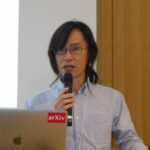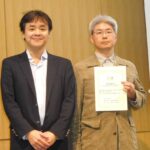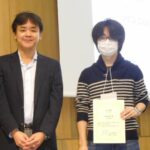On November 23, 2019, the AI ELSI Award ceremony and a lecture by an invited speaker were held at the Joint Workshop 2019 of the Japanese Society for Artificial Intelligence.
Introduction to the award
 Hideaki Takeda, Chairman of the Ethics Committee of the Japanese Society for Artificial Intelligence, introduced the establishment and selection of this award.
Hideaki Takeda, Chairman of the Ethics Committee of the Japanese Society for Artificial Intelligence, introduced the establishment and selection of this award.
AI technology is now being used by society in various ways. Because AI is a general-purpose technology applied closely to human users, it is expected to have a broad impact on society and a direct impact on people’s lives. For this reason, researchers need to consider not only AI in their research and development, but also the relationship between AI and society, as well as the ethical, legal, and social implications (ELSI) of AI technologies.
The AI ELSI Award was established as a forum for the sharing of issues regarding the use of AI in society among academic society members. The Ethics Committee of the Japanese Society for Artificial Intelligence reviewed and selected the applications and activities submitted, and a review committee consisting of experts from within and outside the society deliberated on the selection of the two awards.
Award Introduction and Greetings
The AI ELSI Award was presented by Naohiko Uramoto, Chairman of the Japanese Society for Artificial Intelligence.
 Toshihiro Kamishima (National Institute of Advanced Industrial Science and Technology), was selected to receive the Perspective Award because his research on “A series of AI fairness studies,” has inspired the academic community through an excellent ethical perspective suggesting the direction of future AI research.
Toshihiro Kamishima (National Institute of Advanced Industrial Science and Technology), was selected to receive the Perspective Award because his research on “A series of AI fairness studies,” has inspired the academic community through an excellent ethical perspective suggesting the direction of future AI research.
In his speech, Dr. Kamishima introduced how the detection of data mining technology related to discrimination and fairness has been developed through international conferences. In particular, starting from around 2016, the response to Europe’s general data protection rules (GDPR) and a series of fake news stories involving politics have become issues, and technologies dealing with the issue of fairness have attracted significant attention. International conferences specializing solely on fairness have also been held, making this an extremely important research area as well as a societal issue.
 Kyuri Yamada, the author of the science fiction comic “AI no Idenshi (gene of AI)” (Akita Shoten), was selected to receive the Practice Award for commenting on AI ethics and the relationship between AI and society, describing practical activities such as services, products, or works of fiction that are thought to have had a social impact.
Kyuri Yamada, the author of the science fiction comic “AI no Idenshi (gene of AI)” (Akita Shoten), was selected to receive the Practice Award for commenting on AI ethics and the relationship between AI and society, describing practical activities such as services, products, or works of fiction that are thought to have had a social impact.
In his speech, Mr. Yamada, who was originally an IT media reporter, said that he wanted to consider how new technologies such as artificial intelligence and augmented reality affect society. Without technology, it might not be possible to meet people through social networking sites or overcome various problems. However, meeting people in a virtual space and the issues we face in society can affect our lives. In a future where artificial intelligence technology is widespread, we may encounter various problems, even in normal daily life. The author concluded by stating that he would like to continue to convey the issues regarding actual technological progress that he has personally felt an interest in.
Invited lecture “For Whom The ELSI Be?”
 Mr. Kurosaka Tatsuya (President and CEO, Kuwadate, Inc./Project Associate Professor, Keio University Graduate School of Media and Governance), who is also a member of the review committee for the AI ELSI award, gave a lecture titled “For Whom The ELSI Be?” based on Hemingway’s novel “For whom the bell tolls.” For whom are we doing what we think is good? Mr. Kurosaka explained that the “for whom” question is a good one when considering the ELSI of AI, and that “who is this activity for,” and “who is this message for?” are important perspectives in the process of selecting an award.
Mr. Kurosaka Tatsuya (President and CEO, Kuwadate, Inc./Project Associate Professor, Keio University Graduate School of Media and Governance), who is also a member of the review committee for the AI ELSI award, gave a lecture titled “For Whom The ELSI Be?” based on Hemingway’s novel “For whom the bell tolls.” For whom are we doing what we think is good? Mr. Kurosaka explained that the “for whom” question is a good one when considering the ELSI of AI, and that “who is this activity for,” and “who is this message for?” are important perspectives in the process of selecting an award.
Mr. Kurosaka then described the difference in meaning between invention and innovation. These terms are often used in similar situations, but Mr. Kurosaka explained that “invention” is about inventing something, whereas innovation is popularization. What is “invented” will become “popularized” to the market, and will change our lives over time. When AI becomes innovated, it will be about penetrating and interacting with our daily lives.
So where do we begin to look regarding the ethical, legal, and social implications of technology? Mr. Kurosaka pointed out that this question is not from the stage of the invention but from the stage of innovation. Today, the boundary between invention and innovation is becoming blurred with research product and service creation through interaction with society. However, ELSI is coming into question at “the moment one steps out of the garage.” At this stage, however, neither the products and services nor the ELSI concept are perfect. What should we think when there is no correct answer? For this reason, efforts such as the creation of a sandbox system and special zones, or tokku, in Japanese, will become important.
In the context of deep learning, there are limitations associated with the use of data learning. For this reason, it is important to understand the limitations of technology usage. Among the winners, Dr. Kamishima is tackling issues related to the discrimination and fairness brought about by this very technology. He is also contributing to the creation of communities for this purpose. Another recipient, Mr. Yamada, introduced the ELSI perspective to a wide range of people, including end users and developers, in an easy-to-read format.
The title of this talk, “For Whom THe ELSI Be?” takes the form of a question. Who will benefit from AI? For whom does AI exist? What is happiness? These are questions that help us think about such aspects, and provide clues to how different people communicate. One does not live alone. We live through social interaction. He concluded his talk by stating that, in this world of technology, such an “interaction with society” is also an important perspective when looking at ELSI discussions of AI.
Message through the AI ELSI Award
The Ethics Committee of the Japanese Society for Artificial Intelligence established its “Ethical Guidelines” in 2017. These guidelines emphasize ethics for researchers and developers, and serve as guidance for discussions to enable the healthy use of AI technology in society.
The stories of the winners, Dr. Kamishima and Mr. Yamada, as well as the invited lecturer Mr. Kurosaka, are particularly relevant to the following guidelines.
Article 4: Fairness
Members of the JSAI will always be fair. Members of the JSAI will acknowledge that the use of AI may bring about additional inequality and discrimination in society which did not exist before, and will not be biased when developing AI. Members of theJSAI will, to the best of their ability, ensure that AI is developed as a resource that can be used by humanity in a fair and equal manner.
Article 6: Act with integrity
Members of the JSAI are to acknowledge the significant impact which AI can have on society. They will therefore act with integrity and in a way that can be trusted by society. As specialists, members of the JSAI will not assert false or unclear claims and are obliged to explain the technical limitations or problems in AI systems truthfully and in a scientifically sound manner.
Article 7: Accountability and Social Responsibility
Members of the JSAI must verify the performance andresulting impact of AI technologies they have researched and developed. In the event that potential danger is identified, a warning must be effectively communicated to all of society. Members of the JSAI will understand that their research and developmentcan be used against their knowledge for the purposes of harming others, and will put in efforts to prevent such misuse. If misuse of AI is discovered and reported, there shall be no loss suffered by those who discover and report the misuse.
Thinking about the ethical, legal, and social implications of AI is easy, but it can be difficult to find solutions and ways to realize them. There are different interpretations regarding what is good and for whom, and thus various opinions may exist.
There have been, and will continue to be, various debates and issues surrounding artificial intelligence technology and its use in society. However, it is never a bad thing to have a healthy discussion. What is important is not to persuade the other party or impose one’s own opinions, but to have a dialogue and listen to each other’s thoughts and the values rooted in them.
Article 8: Communication with society and self-development
Members of the JSAI must aim to improve and enhance society’s understanding of AI. Members of the JSAI understand that there are diverse views of AI within society, and will earnestly learn from them. They will strengthen their understanding of society and maintain consistent and effective communication with them, with the aim of contributing to the overall peace and happiness of mankind. As highly-specialized professionals, members of the JSAI will always strive for self-improvement and will also support others in pursuing the same goal.
The Ethics Committee of the Japanese Society for Artificial Intelligence aims to widely share the challenges of AI in society through the AI ELSI Award, which honors activities and research promoting interaction and dialogue in society.
December 1st, 2019
The Ethics Committee of the Japanese Society for Artificial Intelligence
Written by Arisa EMA

